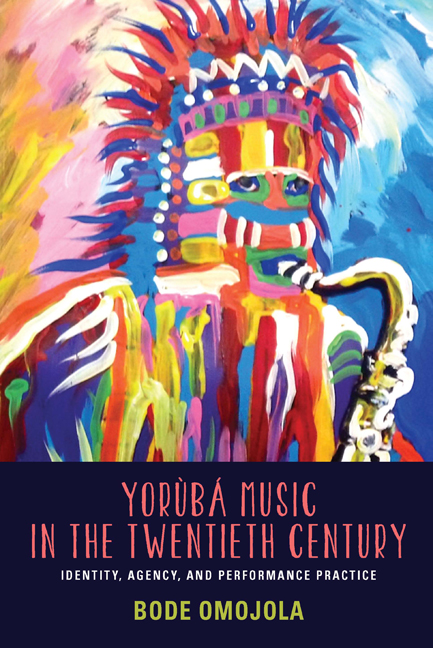Book contents
- Frontmatter
- Dedication
- Contents
- Acknowledgments
- Introduction
- 1 Yorùbá Drumming: Performance Practice and the Politics of Identity
- 2 Talking and Stammering: Toward an Analysis of Yorùbá Drumming
- 3 Songs of the King’s Wives: Gendered and Social Identities in Yorùbá Vocal Performance
- 4 The Aírégbé Song Tradition of Yorùbá Female Chiefs
- 5 Yorùbá Music in the Christian Liturgy: Notation, Performance, and Identity
- 6 Yorùbá Music in Christian Worship: The Aládǔrà Church
- 7 Yorùbá Popular Music: Hybridity, Identity, and Power
- 8 Yorùbá Islamic Popular Music
- Conclusion
- Appendixes
- Notes
- Selected Discography and Videography
- Bibliography
- Index
Conclusion
Published online by Cambridge University Press: 11 January 2024
- Frontmatter
- Dedication
- Contents
- Acknowledgments
- Introduction
- 1 Yorùbá Drumming: Performance Practice and the Politics of Identity
- 2 Talking and Stammering: Toward an Analysis of Yorùbá Drumming
- 3 Songs of the King’s Wives: Gendered and Social Identities in Yorùbá Vocal Performance
- 4 The Aírégbé Song Tradition of Yorùbá Female Chiefs
- 5 Yorùbá Music in the Christian Liturgy: Notation, Performance, and Identity
- 6 Yorùbá Music in Christian Worship: The Aládǔrà Church
- 7 Yorùbá Popular Music: Hybridity, Identity, and Power
- 8 Yorùbá Islamic Popular Music
- Conclusion
- Appendixes
- Notes
- Selected Discography and Videography
- Bibliography
- Index
Summary
My discussion of Yorùbá music in this book has demonstrated how a unique and socially responsive musical culture has been shaped and sustained in a variety of forms since the late colonial period. In painting a multiple and an accretive profile of Yorùbá music, I have discussed how modern musical genres have evolved out of ancient Yorùbá traditions in response to new existential realities, and how such realities have been interpreted, appropriated, and filtered according to the vision, understanding, challenges, and experiences of musicians and audiences. I have also explained that although various Yorùbá musicians and musical practices draw on what may be described as pan-Yorùbá elements, each musical genre or style is strategically grounded to respond to specific needs and interests. Yorùbá musical traditions are thus conceived, performed, and experienced as narratives of identity through which drummers, dancers, singers, and chanters express self-mediated visions of their social and cultural environment. Dating from the antiquated era of Àyànàgalú (the Yorùbá pioneer drummerturned- deity) and extending into the colonial and postcolonial world of modern musicians, Yorùbá musical traditions have been shaped as a form of social and cultural expression in which communality, spirituality, negotiation, resistance, critique and, of course, social entertainment are inscribed.
The process of reworking Yorùbá and non-Yorùbá elements is shaped by a need to challenge, resist or reconfigure existing or imposed conventions, and identify a group or an individual through music. The process is strategic and competitive, even when a sense of unity or solidarity is thematized in a musical performance, or when traditional institutions are valorized, as in the case of Aírégbé and Olorì musical performances. For example, although Aírégbé and Olorì songs project the values of their larger (Emùré-Èkìtì) community and extol the qualities of the king, they are anchored in unique musical styles that have come to define the identities of the two categories of women who perform them. In the case of Olorì, we see two parallel uses of their music. The first one is occasional, occurring when there is a public event such as the annual new yam festival. At such a forum, the women sing in honor of their king and articulate shared values.
- Type
- Chapter
- Information
- Yorùbá Music in the Twentieth CenturyIdentity, Agency, and Performance Practice, pp. 221 - 230Publisher: Boydell & BrewerPrint publication year: 2014

